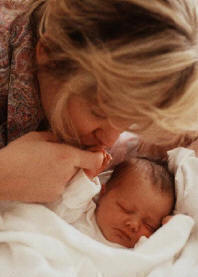|
|
|
|
Starting Solid Foods
Breast milk is all your baby will need until at
least 4 months of age. There does come a time,
when breast milk will no longer supply all of your
baby's nutrition needs. Full term babies will
start to require iron from other sources by 6 - 9
months of age.
Some babies that aren't started on solid foods by
the age of 9 - 12 months may have a great level of
difficulty accepting solid foods. It's actually
a developmental milestone when your child starts
solid foods - as he is now growing up.
When to start
The ideal time to begin solid foods is when the
baby shows interest in starting. Some babies
will show interest in solid food when it's on
their parents' plates, as early as 4 months of
age. By 5 - 6 months, most babies will reach out
and try to grab the food. When the baby starts to
reach for food, it's normally the time to go
ahead and give him some.
Sometimes, it may be a better idea to start food
earlier. When a baby seems to get hungry or once
weight gain isn't continuing at the desired rate,
it may be good to start solid foods as early as
3 months. It may be possible however, to continue
breast feeding alone and have the baby less
hungry or growing more rapidly.
Breast fed babies will digest solid foods better
and earlier than artificially fed babies because
the breast milk will contain enzymes which help
to digest fats, proteins, and starch. Breast
fed babies will also have had a variety of
different tastes in their life, since the flavors
of many foods the mother eats will pass into her
milk.
Introducing solid foods
When the baby begins to take solid foods at the
age of 5 - 6 months, there is very little difference
what he starts will or what order it is introduced.
You should however, avoid spicy foods or highly
allergenic foods at first, although if your
baby reaches for the potato on your plate, you
should let him have it if it isn't too hot.
Offer your baby the foods that he seems to be
interested in. Allow your baby to enjoy the food
and don't worry too much about how much he takes
at first, as much of it may end up on the floor
or in his hair anyhow.
The easiest way to get iron for your baby at 5 -
6 months of age is by giving him meat. Cereal for
infants has iron, although it is poorly absorbed
and may cause your baby to get constipated.
Ten Baby Food Safety Tips
1. Never leave your baby alone with food. Stay close during feeding time, and
know how to handle a choking baby.
2. Don't give your baby nuts, hot dogs, pretzel sticks, chips, raw carrots and
other items that could cause choking. Give your baby foods that are mashed,
pureed, or easily dissolve in baby's mouth (like Ritz crackers).
3. Never give honey to a child under 12 months of age. Some pediatricians even
recommend waiting until your child is more than 18 months old.
4. Be careful with common allergens such as peanut butter, orange juice, eggs,
corn and wheat. If your family has a history of allergies, speak to your
pediatrician about what solids you might avoid and for how long.
5. Don't store uneaten portions of food in the fridge - throw them out. Saliva
from your baby's mouth can cause bacteria to grow in unused portions of food.
6. Never microwave food for your baby. Even if stirred thoroughly, some parts
may remain hot and could burn your child. Most jarred baby food doesn't need to
be heated anyway, and you can always heat food in your oven or on the stovetop.
7. Don't reduce your baby's fat intake when feeding solids. Your baby will not
benefit from "light" foods or "low fat" foods; he needs the fat.
8. Never put baby cereal or any other solid food into a bottle for baby. It can
be a choking hazard and is not good for the teeth.
9. Don't give your baby food in the car. Unless you are watching him at all
times (which means you aren't watching the road!) you may not hear him if he
starts to choke.
10. Be careful with foods that can get caught in the teeth (such as raisins).
Wipe your baby's gums and teeth with a wet washcloth until he is old enough to
brush.
|
|
|
|
Bringing Baby Home |
|
 |
|
|
Your newborn goes
through a lot right after heís born. Whether the
birth was natural or assisted, he experiences a
great deal of stress as he copes with the abrupt
change in the world as he knows it.
The first days home with baby can be trying. If you stay calm, however, these simple tips
will ease the transition for both of you.
More |
|
|
|
 |
Baby's Naptime |
 |
If you baby is not napping well during her first few months of life, you may
want to try to cut back on the time she is awake by 15 minute increments. |
|
If she is
getting over-stimulated, then she will fight
sleep and be difficult to get to nap.
More |
|
|
|
|
Bath
Time For Baby |
|
Bath time is a special time of bonding
with a baby and her parents. |
 |
|
Itís a time to play gently, talk and
sing. Get everything you will need
ready before you start! Here's a
list of things you should have ready...
More |
|
|
 |
Breastfeeding Basics |
|
 |
Breast milk is the best food
you can give to your baby.
Once you've given birth breast feeding is the single
most important |
|
thing you can do to protect your baby
and help to promote good health. Best of all, breast
feeding is free.
Along with saving you money on HMR (Human Milk
Replacement), breast feeding can also help you to keep your medical bills down.
Babies that
are fed
with formula get sicker more often and more seriously
than babies that are breast fed They also have more
ear infections, respiratory infections, and other
problems.
More |
|
|
|
|
What Every Parent Needs To Know |
|
 |
I t
starts the day you bring your newborn
home...
Every parent
wants to make sure they provide for their
child the best they can. Every day of their
young lives. But infants don't come home
from the hospital with a manual.
Loving your
child is the easy part. |
|
Making sure you
raise them to the best of your ability is
not. When every person you turn to has an
opinion about where to put your baby's
cradle, to listen to their crying or to
ignore it...
With so much
information out there, it's important for
you as a parent to make sure you take the
time to learn how to care for a child. You
and only you can do this for yourself. But,
we can help.
"Easy Motherhood"
Click here to read
more |
|
|
|
|
|
|